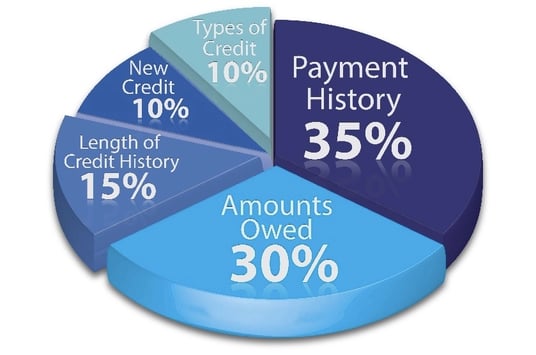Raise your credit score today with these 6 easy tips!

Before starting your homebuying process, it’s important to get your FICO credit score as high as possible! A higher credit score will give you access to better rates and products and save you thousands of dollars over the life of your loan!
What is a Credit Score?
A credit score is a number assigned by each of the 3 major credit bureaus based on your credit behavior. Credit scores range from 300 to 850. As a rule, to qualify for a home loan, you want your credit score to be above at least a 580 from each bureau, though most consumers’ credit scores range from 600 to 750. A score above 620 from each bureau will give you access to better quality loan products and a score higher than 720 is considered excellent among lenders.
What makes up your Credit Score?
Your FICO credit score is made up of 5 components: payment history (35%), amounts owed (30%), length of credit history (15%), new credit (10%) and credit mix (10%). For instance, having a track record of 5 years is better than a track record of 2 months. If you have had the same credit card throughout your credit history, that would be an additional benefit, which is why some people never cancel their credit cards! Here’s a helpful chart to visualize how these pieces come together:

How can you raise your credit score quickly?!
Some people think that raising your credit score is nearly impossible. What many Americans don’t realize is that you can raise your credit score faster than you think with these 6 quick and easy tips.
Tip #1: Find out what your current credit score is!
You can’t fix the problem until you find out the issues! You have the right to obtain a free credit report once a year. Before paying off any bills or opening new lines of credit, visit annualcreditreport.com to get your credit report and score from each of the three major credit bureaus without negatively impacting your credit score. Obtaining your credit report will help you find the problem areas and put you in the best position to address them!
Tip #2: Dispute any errors on your credit report!
Disputing and resolving errors that you find on your credit report can lead to HUGE increases in your credit score. Make sure to gather all the materials necessary to make your dispute before starting your dispute to avoid unnecessary back and forth. All three bureaus have an online dispute process, which will likely be the fastest way to fix your problem, but you can write a letter as well. You cannot make a dispute over the phone.
Tip #3: ALWAYS pay your bills on time and try to make more than just the minimum payment!
Make sure to never miss payments or have any late payments. Having 30+ Day late payments appear on your credit report causes significant damage to your credit score and your credit score can take up to 7 years to fully recover. Setting up autopay is a good first step to never forgetting a payment, but event autopay can glitch. Double check to make sure all payments we made at least once a month. Always try to make more just the minimum payment, as the high interest rates on credit cards will slowly but surely increase your debt and lower your credit score over time. If you need help budgeting your payments and other expenses against your income, tools like Mint are great for helping you improve your personal financial management.
Tip #4: Pay off old debt that may be in collections!
More than 75% of American households carry some amount of debt, but not all debt is equal in the credit reporting world! The easiest way to raise your score quickly is by paying off old debts, even very small one, especially if those debts are in collection. This is low-hanging fruit that can make a BIG difference. An unpaid utility bill or a 10-year-old outstanding parking ticket might be the biggest obstacles standing between you and your best credit score and they might be very easy to pay off!
Tip #5: Increase your credit utilization/credit limit! But please do not to apply for too many credit cards!
Credit utilization—the amount of your existing credit debt divided by the total amount of your available credit—is one of the most important factors contributing to your overall credit score. Optimal credit utilization is about 30%—enough to show creditors that you can responsibly pay your bills without leaning too heavily on credit cards when spending. Raising your credit limit, then, is a good way to lower your credit utilization ratio.
To increase your credit limit, you can 1) apply for more credit cards, 2) call your current credit card and request an increase on your credit limit or 3) ask to become an authorized user on a family or spouses credit card to increase your credit limit. Note: Applying for a credit card requires a hard credit check, which will temporarily lower your credit score.
Tip #6: Do NOT make a major purchase or secure a new loan right before applying for a home loan.
Major purchases and new debt require hard pulls to understand your credit history. Too many hard credit checks (or “hard pulls”) in one year can have a long-term impact on your credit. LendFriend recommends no more than 3 hard pulls a year if you can avoid it.
Bonus Tip: When in doubt, call LendFriend!
If you’re having trouble making heads or tails of your credit report and overall financial situation, the LendFriend team is always available to help you come out on top. Even if you’re not planning on buying a home today, we can still help you understand your options and get your finances in the best position for when you are ready to buy. Reach out to us today at 512.881.5099 or apply now, and one of our loan officers will be in touch as soon as we receive your application.

About the Author:
Mike Bernstein